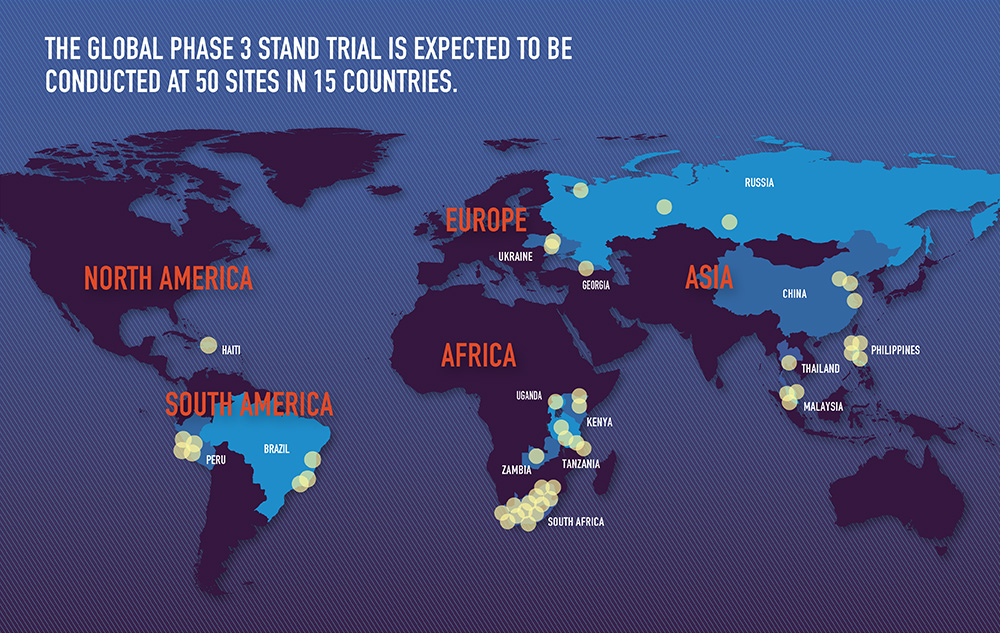
TB Alliance's goal is to reduce the global burden of TB through the development and availability of dramatically improved treatments.
TB must be treated with multiple drugs. Achieving maximum impact on the epidemic requires a short, simple, and affordable regimen comprised of all news drugs, circumventing the challenges posted by resistance to some of the antibiotics available today.
Such a universal
regimen could erase the distinctions
of MDR-TB or XDR-TB, being effective in virtually all
people with active TB. This would significantly improve TB control efforts globally.
Over the past year, TB Alliance launched a new wave of clinical trials, detailed below. These trials demonstrate the major progress made toward our goal of a fully novel regimen by constituting treatments with one, then two, and then three novel drugs.

The PaMZ regimen, consisting of one novel drug candidate pretomanid, (formerly PA-824), moxifloxacin, and pyrazinamide, is the most advanced novel regimen currently in development. It shows promise to improve treatment for those with drug-sensitive TB and those with TB/HIV co-infection. It also shows the potential to markedly improve treatment of many patients with multi-drug resistant tuberculosis (MDR-TB) by being dramatically shorter, simpler, safer, and more affordable than current standard therapy.





Bill Gates explains how PaMZ can revolutionize TB treatment for some MDR-TB patients.

Based on results of previous research, PaMZ has now advanced to its final stage of testing. The global Phase 3 clinical trial called STAND (Shortening Treatments by Advancing Novel Drugs) has begun, and will enroll up to 1500 patients in 15 countries at approximately 50 sites around the world. It will be the first Phase 3 trial to test both drug-sensitive and MDR-TB patients with the same regimen. The trial will be conducted by TB Alliance, University of St. Andrews, University College London, among other partners.
The BPaZ regimen is comprised of two novel drugs, bedaquiline and pretomanid, in addition to pyrazinamide. The regimen shows potential to treat drug-sensitive tuberculosis and some forms of drug-resistant TB in as little as three months. Based on the published results of the Phase 2a two-week trial and earlier studies, BPaZ advanced to a two-month Phase 2b clinical trial, called NC-005, which began in 2014. The trial will enroll patients, whose TB organisms are sensitive to the drugs in the regimen, at 10 sites in South Africa, Tanzania, and Uganda.

TB Alliance, over the course of 2014, initiated the foundational studies and other work needed to soon begin the NiX-TB (New Investigational Drugs for XDR-TB) trial. The study is expected to be among the first clinical trials to test a new treatment specifically for XDR-TB (extensively drug resistant tuberculosis patients). XDR-TB is one of the deadliest forms of TB. Today, only a fraction (11%) of people with XDR-TB will be cured.
The regimen being tested in NiX-TB to treat XDR-TB is comprised of three drugs with little or no known resistance: bedaquiline, pretomanid, and linezolid. However, the true potential of such a regimen is even greater. Given the lack of pre-existing resistance to the drugs in this regimen, it shows potential to be a universal regimen — in other words, a single TB regimen that can treat virtually all patients with active TB — with a relatively simple and affordable regimen. The NIX-regimen must first be tested in XDR-TB patients because it may be more toxic than current MDR-TB therapy, but if the regimen proves successful and safe, that will pave the way for expanding the study, leading to potential use in (MDR-) TB patients and then potentially to drug-sensitive TB patients.
Children with TB are neglected. Today, there are no appropriate child-friendly medicines to treat children with TB. We are currently working with partners to reformulate existing drugs for drug-sensitive TB into appropriate, child-friendly products, and have engaged manufacturers to ensure there will be a sustainable supply of these new products. Those products are expected to be available by 2016.
If children with TB are neglected then babies with TB have been completely ignored. The dosing of TB medicines for newborns and infants weighing 5 kg or less had never been adequately studied. In 2014, Desmond Tutu TB Center, an academic research center of the University of Stellenbosch, South Africa, collaborated with TB Alliance to launch a trial to determine the appropriate doses and formulations of today's TB treatments for the youngest infants.
Additionally, the learnings from this project will inform the development of child-appropriate formulations of new TB treatments currently in the development pipeline, thereby reducing the delay between the availability of new TB treatments for adults and children.
